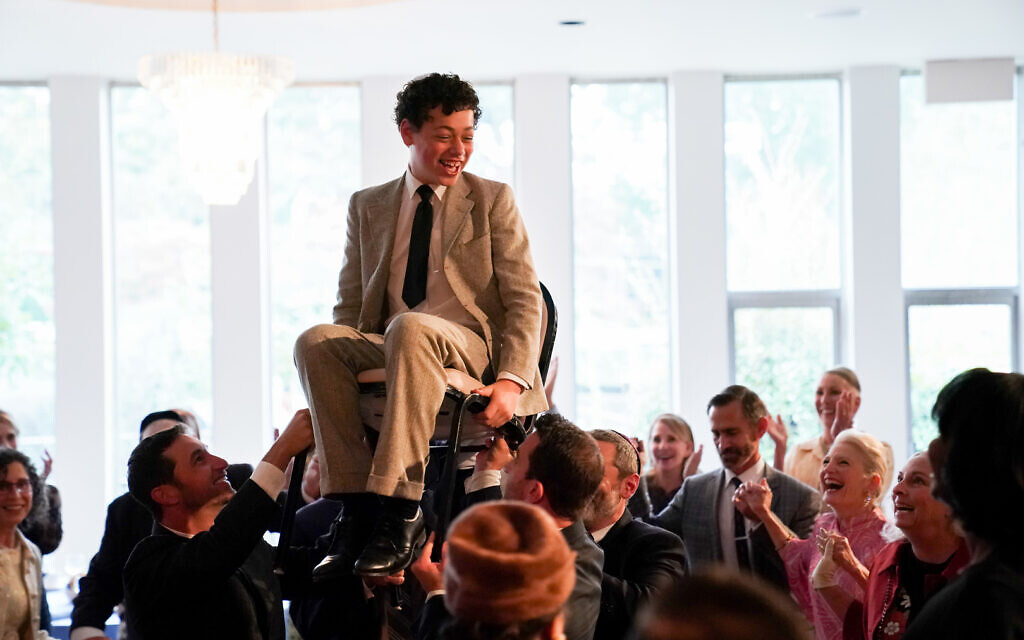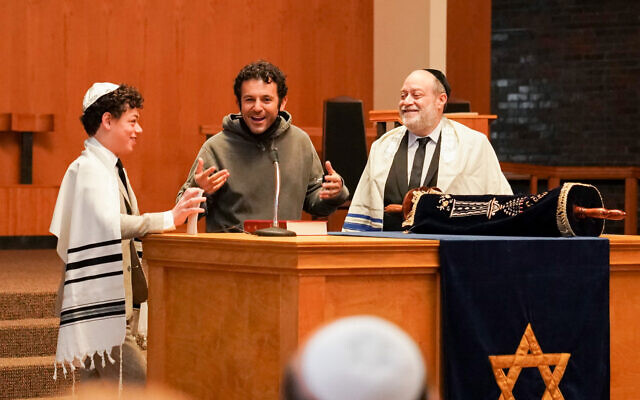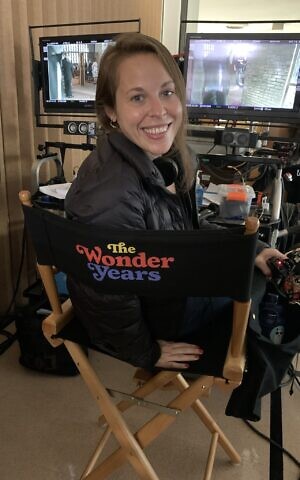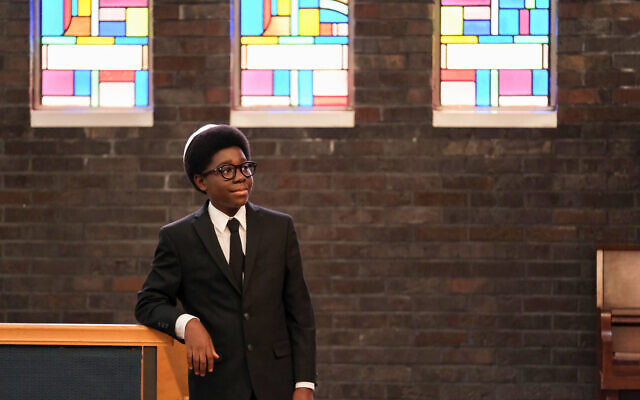From doily head coverings to pre-speech jitters, the rebooted sitcom managed to capture the Jewish rite just right, largely thanks to screenwriter Yael Galena’s own experiences

The Jewish world kvelled over last week’s episode of ABC’s popular primetime sitcom “The Wonder Years,” in which character Brad Hitman stressed over his upcoming bar mitzvah and juggled fears of public speaking with potential crises including his voice cracking, forgetting how to chant his Torah portion and dropping the Torah scroll.
Among those beaming with pride as they watched that night was Los Angeles resident Yael Galena, the show’s sole Jewish female staff writer.
“I was raised in a Modern Orthodox Jewish family, so television was my link to the outside world and I was obsessed with it,” says Galena, whose credits include docuseries on A&E, TLC and OWN. “I went to public high school and was basically an awkward, Modern Orthodox kid trying to fit in — which was not a great experience and always uncomfortable.”
Set in Montgomery, Alabama, in 1968 during the period of desegregation when racial prejudices still loomed large, “The Wonder Years” reboot tells the coming-of-age story of 12-year-old Dean Williams and his African American middle-class family as they navigate daily suburban life against the backdrop of the Vietnam War, the assassination of Dr. Martin Luther King, Jr. and the societal awakening brought on by the civil rights movement. On the cusp of adolescence, Dean and his friends are more preoccupied with girls, the teen social scene, baseball, adult magazines and asserting their independence.
Like the original series created by Neal Marlens and Carol Black that aired from 1988 to 1993, the reboot’s storyline is recounted through the eyes of its young protagonist. Back then, the main character, Kevin Arnold, was played by Fred Savage, teen heartthrob to thousands of young girls — including Galena, who was a “huge fan” of the show as a child in Merion Station, Pennsylvania.

Galena realized while working in unscripted TV in New York in her early 30s that her true dream was to write for a television show.
“I didn’t want to admit that to myself, because it felt so far-fetched,” says Galena, who holds a BA in Electronic Media from George Washington University. “I think we’re all just so afraid of failure that at times we don’t even want to try. I reached a point of thinking, ‘I have one life. I could either stay with what I’m doing and wake up when I’m 50 and regret it, or I could pursue my passion.”
After a decade of living in New York, the prospect of starting over in the industry and working her way up from the bottom in LA was nerve-racking, but she took the plunge. Once there, she enrolled in a number of script anatomy classes taught by former and current TV writers to learn the art of writing a good pilot. The classes served as a writing community and through her new contacts, Galena landed her first two-year gig as a writer’s assistant for TNT’s “Claws.”
“As a writer’s assistant, you take notes and your whole job is to listen,” says Galena. “Those two seasons were like getting my master’s in television writing. I watched these incredible writers write a story and punch up jokes, and I knew that this was exactly where I wanted to be.”
In 2020, Galena became a staff writer for Netflix’s animated show “Super Giant Robot Brothers.” Around that time, her rep submitted a pilot Galena had written to “The Wonder Years,” which caught creator Saladin K. Patterson’s attention.
“I interviewed with Saladin, then with two of the producers and Fred, over Zoom,” Galena recalls.
“It was terrifying but it felt like a feat just to get the interview. I figured, if this is all there is, that’s fine. It was very dayenu-esque — I had had an interview with Fred Savage and that was good enough for me,” she said, referring to the Passover Seder-night song about God’s gifts to the Jews.
“Getting the job was such a thrill, then my first episode being about the Jewish story was incredible. And then finding out that Fred was going to direct it was the culmination of all the things I’ve ever wanted. I didn’t even dare to dream this big. When you get this far, you realize there’s so much possibility and opportunities that you didn’t even think of,” she says.
As the show’s executive producer, Savage oversees all episodes, but he only directs some of them. While Galena says it was natural for Savage, who was raised Reform, to play an active role in the “Brad Mitzvah” episode, she was both honored and relieved to have his hands-on collaboration.
“Fred’s obviously done this his whole life; this is old hat to him. I think it was exciting for both of us to bring in this Jewish element to the show. We were able to discuss specific things in shorthand, and we were almost ‘out-Jewing’ each other. It was a real highlight for me,” she says.
The episode everyone’s talking about
Galena is especially proud of the considerable thought and meticulous details that went into writing and producing the episode.

“Almost everything [the character] Brad Hitman goes through on ‘The Wonder Years’ comes from my own experiences, in a broader sense,” says Galena. “As a student I’d often write about my name in essays. Outside of the Jewish community, my name is confusing to everyone… often I was even embarrassed of having a name that stood out; as a kid, you just want to fit in.
“Of course, what was embarrassing in your youth becomes your greatest strength in adulthood,” she says. “My name is what allows me to stand out, especially in my job. And the story of Yael is so incredible and empowering. Now I love my name, and I cringe when I think about the amount of times I tried to minimize my Jewishness to fit in. So when I had to write Brad’s speech, I felt like all of those times of pronouncing and re-pronouncing my name had led me to that one moment — to the speech. I knew I wanted to talk about Brad’s name and identity.”
She consulted with Montreal’s Rabbi Reuben Poupko, who shared a midrash about the three names in Judaism that every person has: the name given by one’s parents, the name given by one’s peers, and the name one acquires for oneself.
“When Rabbi Poupko relayed that dvar Torah, I was like, ‘That’s it! That’s the one,” says Galena, using the Hebrew term for a short Bible lesson ending with a moral. “Everything fell into place. It was serendipitous. And so the name motif was such a big part of the episode just as it was part of my own story.”
But it was the incorporation of symbolism and other minor details that highlighted the depth of Galena’s Jewish knowledge and pride, and which made the episode so true-to-life. Thanks to Galena’s knowledge of the Bible, the episode included details such as Brad’s bar mitzvah weekly Torah portion, which is “not one of those cool portions, about locusts or boils,” but about “a father giving advice to his sons on his deathbed.”
What’s more, Brad’s great-aunt was portrayed as a Holocaust survivor who had a tattoo with the number 613 — a number symbolic in Judaism which Galena expressly chose as she imagined it might have “provided the tiniest bit of solace for Aunt Ruth” during such a dehumanizing time.
For Galena, the addition of a Holocaust survivor in the episode was critical.
“Brad’s bar mitzvah took place during a period of history where Jews were marching right next to Martin Luther King; Jews were showing up for the cause. I wanted to highlight that allyship and honor, that part of our shared history,” Galena says.
“A way to show this was through a Holocaust survivor character. We wanted to show that surviving injustices and hate of the past gives you that compassionate perspective for injustices of the present. So at Brad’s bar mitzvah, we showed this racist guy staring at the Black guests. And then immediately we showed Aunt Ruth, a person full of compassion who understands what it’s like to be othered and hated,” she says.

From the Pentateuch-shaped bar mitzvah cake and assorted kippahs to the hora dancing, floral centerpieces and true-to-life synagogue plaques and posters, the show nailed the bar mitzvah props, rituals, and food to a tee. Galena recalls that the art, props and wardrobe departments were constantly checking in with her and Savage to make sure they were on point.
“Whenever you put anything in a script, everyone [on set] reads it as though it’s the Bible,” says Galena. “So I made sure to put in every food that I wanted to see at the bar mitzvah. I wrote out ‘kugel, knishes, gefilte fish, brisket.’ And the crew all nailed it. They got them all. And then of course I pocketed 90 percent of the stuff for myself.”
The most funny experience for Galena was having to explain that many Jewish married women cover their hair in synagogue with doilies.
“It probably sounded insane [to the crew] that women would get all dolled up for shul and then plop a dollar store doily on their head,” she says. “They wanted to use really fancy ones and I was like, ‘No, just use a throwaway!’ When we got to Congregation Shearith Israel in Atlanta where we shot the episode, there were actually a bunch of doilies, which I was happy about, because I understand that from an outsider’s perspective what I said didn’t make total sense.”
As for her future plans, Galena has a number of projects in the pipeline, including another pilot and feature that are being “shopped around.” An episode of “Kings of Napa” which she co-wrote will also be airing in a few weeks on OWN. And those eager to see more of Galena’s influence in “The Wonder Years” will be thrilled to learn that she has written another episode which she’ll begin shooting in two weeks.
“I’m hoping that the show continues for many seasons to come,” she says. “I’m continuing to work on my own stuff, but truly, I’m just down to ride with ‘The Wonder Years’ for as long as they’ll have me.”
As reported by The Times of Israel
